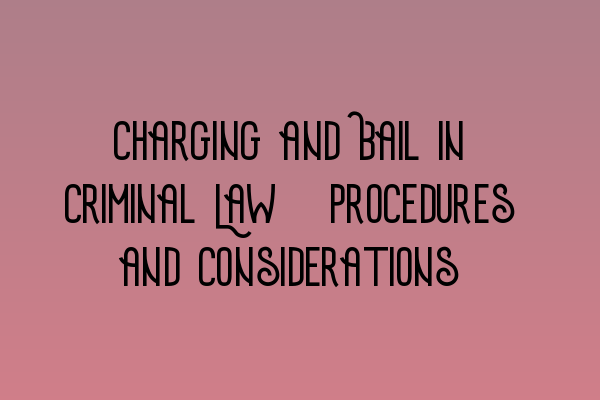Charging and Bail in Criminal Law: Procedures and Considerations
When it comes to criminal law cases, the procedures and considerations for charging and bail play a crucial role in ensuring a fair and just legal process. Whether you are a defendant, a lawyer, or simply interested in understanding the intricacies of the criminal justice system, this comprehensive guide will provide you with valuable insights.
Understanding the Charging Process
The charging process in criminal law refers to the formal accusation made against an individual suspected of committing a crime. It is the first step in the legal process and is essential for initiating criminal proceedings. The decision to charge an individual involves a careful assessment of the available evidence and the fulfillment of legal requirements.
During the charging process, the prosecution team will gather evidence, interview witnesses, and analyze forensic reports to build a strong case against the defendant. This evidence will then be presented to a charging officer or a magistrate, who will decide whether there is sufficient evidence to support the charges. The charging officer must consider the public interest and the evidential foundation before proceeding with the charges.
If the charging officer finds sufficient evidence, the defendant will be formally charged and issued with a charge sheet detailing the offenses they are accused of. It is crucial to have legal representation at this stage to understand the charges and to prepare an effective defense strategy.
Overview of the Bail Process
Bail is the temporary release of a defendant from custody pending their trial or court appearance. It is an essential aspect of criminal law as it aims to strike a balance between the presumption of innocence and the protection of public safety. The decision to grant or deny bail depends on several factors, which are assessed during a bail hearing.
During a bail hearing, the court will consider various factors, including the severity of the alleged crime, the defendant’s ties to the community, their previous criminal record, and the likelihood of them fleeing before trial. The court may also impose conditions on the defendant’s bail, such as surrendering their passport or reporting to a police station regularly.
If bail is granted, the defendant will be released from custody and must comply with the imposed conditions. Failure to comply with the bail conditions can result in the revocation of bail and the return to custody. However, if bail is denied, the defendant will remain in custody until their trial or court appearance.
Considerations for Charging and Bail
When it comes to charging and bail decisions, various factors come into play. The primary consideration is the strength of the evidence against the defendant. The prosecution must have sufficient evidence to support the charges and to convince a court of the defendant’s guilt beyond a reasonable doubt. Additionally, the nature and severity of the offense also play a role in determining the charges and the bail decision.
Other considerations include the defendant’s criminal history, their ties to the community, the risk of them interfering with witnesses or evidence, and the likelihood of them absconding before trial. These considerations aim to assess the defendant’s character, their potential danger to society, and the likelihood of them appearing in court for trial.
It is essential to seek legal representation from a criminal defense lawyer who specializes in charging and bail matters. They will review the evidence, analyze the circumstances of the case, and provide expert guidance on the best defense strategy.
For more information on criminal law procedures and related topics, check out these related articles on our website:
- Ensuring Ethical Business Practices: Delaware’s Code of Conduct
- Legal Challenges for UK Businesses in the U.S.: Strategies for Overcoming Hurdles
- UK Criminal Law: An In-Depth Analysis of the British Legal System
- Legal Challenges for UK Businesses in the U.S.: Strategies for Overcoming Hurdles
At SQE Criminal Law & Practice Law UK, we are committed to providing expert legal advice and guidance on criminal law matters. Contact us today for professional assistance and representation.
